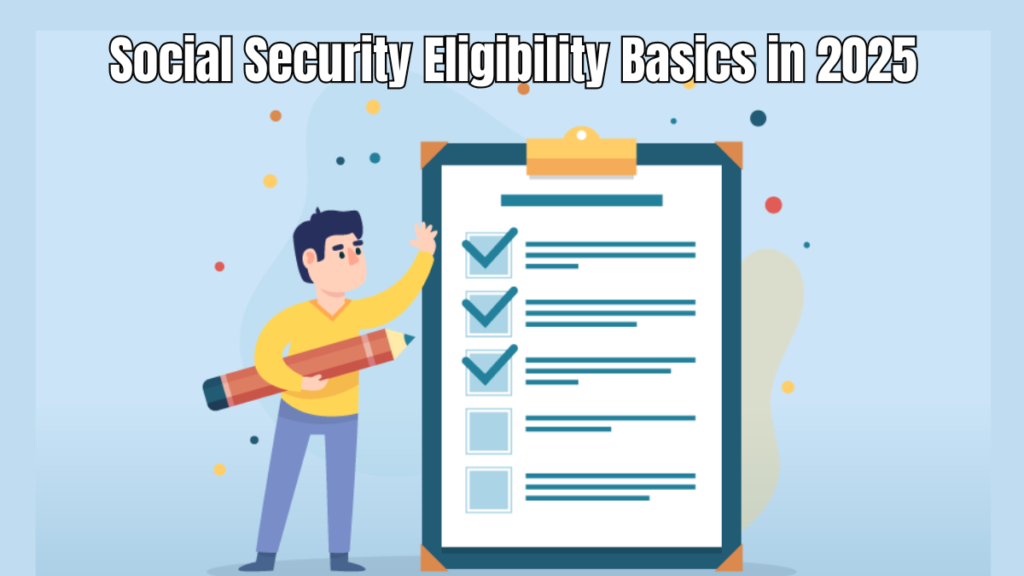Social Security is a very crucial economic selection in American retirement planning.
The age at which you start receiving blessings may have a profound impact on your monthly check, and the difference can add up to hundreds of thousands of dollars, which could make a massive difference over your lifetime.
The question we are asking about this selection in 2025 is—”When is it quality to get hold of Social Security blessings?” The answer is not sincere. It entails many character factors, which include your fitness status, economic desires, employment scenario, and your long-term retirement dreams.
This guide aims to help you apprehend when the best time can be for you so that you can plan for your retirement successfully and revel in a lifetime of financial security.
Whether you’re near retirement or planning for the future, it will likely be useful to recognize those elements so you can make the maximum of this critical part of your retirement earnings.
Social Security Eligibility Basics in 2025

There are a few primary eligibility necessities you need to recognize to acquire Social Security benefits.
To acquire Social Security retirement blessings, you have to earn forty “credits” over your operating life; that is usually made feasible by way of running for 10 years and paying Social Security taxes.
In 2025, you get hold of one credit for every $1,740 of earnings and may earn up to four credits in step with 12 months.
This limit adjusts each year for wage inflation so the system keeps up with current economic conditions.
Your benefit is based on your highest 35 years of earnings, adjusted for inflation.
If you’ve worked fewer than 35 years, those fewer years matter as zero; that may reduce your gain quantity.
It’s vital to understand that Social Security is only presupposed to update up to 40% of your pre-retirement earnings. Therefore, for most Americans, having different financial savings plans in the area is a must to secure retirement.
Understanding this basic information will help you make the right decision so you can choose the right time to receive your benefits.
Important Ages and Benefit Receipt Timing
When it comes to receiving Social Security benefits, there are three main ages that matter the most:
Age 62: Early Eligibility
62 is the age you can begin receiving Social Security benefits.
However, taking benefits at age 62 will cause you to face a permanent reduction in your monthly benefit.
If your full retirement age is 67 in 2025, taking benefits at age 62 will reduce your monthly benefit by 30%. This can be an important decision, especially in terms of long-term planning.
Despite this, about 35% of men and 40% of women choose to receive benefits at age 62.
This decision is usually made because of urgent financial needs, health problems, or an employment situation that requires immediate benefits, even if the monthly benefit is cut.
If you have a short life expectancy or immediate financial pressures, this option may make sense, even if it results in a permanent reduction in your benefits.
Age 67: Full Retirement Age (FRA)
Age 67 is when you can get hold of your complete retirement gain amount, with no reductions.
For the ones born in 1960 or later (who may be turning 67 in 2025), full retirement age is 67.
At this age, you may acquire your complete calculated advantage quantity.
For those born between 1955 and 1959, full retirement age will progressively increase from 66 years and 2 months to 66 years and 10 months.
Taking benefits at full retirement age will neither reduce your benefit nor provide any additional benefits. This is considered a common benchmark against which other age options are compared.
Age 70: Maximum Benefit Amount
If you delay taking benefits after age 67, each month your benefit will increase by about 2/3% (or 8% per year).
This means that if you delay taking benefits between 67 and 70, your monthly benefit will increase by 24%, which will last for the rest of your life.
There is no further increase in benefits after age 70, so this is the best time to maximize benefits.
If you have sufficient resources to delay and your life expectancy is good, waiting until age 70 can significantly increase your retirement security, especially when health care and other expenses start to rise.
Financial Impacts of Different Benefit Receipt Ages
The timing of when you receive benefits has a financial impact not only for your on-the-spot advantages but also for your general lifetime advantages and ordinary retirement protection.
Here’s an example that indicates how big a distinction your Social Security advantages could make depending on your claiming age:
Let’s say someone is receiving $2,000 per month at full retirement age (age 67):
- If that person claims at age 62, they will receive approximately $1,400 per month.
- If that person claims at age 67, they will receive the full $2,000 per month.
- If that person delays claiming until age 70, they will receive approximately $2,480 per month.
This $1,080 difference between age 62 and age 70 adds up to a difference of approximately $13,000 annually. That’s a significant amount that can add up over many years or decades.
Although claiming early will give you more checks throughout your life, each check will be less in amount, meaning you may get less overall if you live the average lifespan.
The “break-even age” is usually around age 80, after which claiming late can result in higher lifetime benefits. With the average life expectancy of today’s 65-year-olds now stretching into the mid-80s, many retirees may benefit from claiming late to maximize their benefits, provided they have good health conditions.
Personal factors that affect your claiming age:
- Health and lifestyles expectancy: If you have bad health conditions or your own family lives shorter lives, you could find it useful to assert early. But if you are in proper fitness and your family has a history of durability, claiming late may additionally yield extra advantages.
- Current monetary scenario: If you are going through financial hassle or need money immediately, claiming early can be vital. But when you have sufficient savings, you may delay claiming to maximize benefits.
- Employment status and plans: If you are working and have a good income, claiming may reduce your benefits. In 2025, if you claim before your full retirement age, you will have $1 deducted from your benefits for every $2 you earn above $21,240. However, after full retirement age (age 67), this reduction ends, and you can have unlimited income.
- Marital status and spousal benefits: If you are married, you should make a careful decision about your and your partner’s benefits. If one spouse has a higher income and the other a lower income, the lower earner should claim first while the higher earner should delay. This will make the spouse’s survivor benefits more beneficial in the long run.
Special considerations for 2025:
- Cost-of-living adjustments (COLA): In 2025, benefits may increase due to COLA, which is typically pegged to inflation. This increase provides a cushion to the Social Security program against inflation and is especially important during retirement when savings from other sources may be exhausted.
- Taxes on benefits: Your Social Security benefits may be taxed, depending on your income level. For 2025, if your total income is between $25,000 and $34,000, 50% of your benefits will be taxed. If it’s above $34,000, up to 85% may be taxed.
Ways to maximize your benefits:

- Ensure accurate earnings records: Regularly check your Social Security earnings records to ensure all income is reported correctly. An incorrect or missing earnings year can affect your benefit calculation.
- Maximize your 35 highest-earning years: If you’re earning more income later in your career, that can increase your benefits.
- Combine with other retirement income sources: Combining Social Security with pensions, retirement accounts, and other income sources can help you maximize your benefits.
Some common myths:
- “It’s better to claim early because Social Security might run out”: Although the Social Security system is facing financial challenges, it won’t run out completely. Even without any changes, it would provide 76-79% of benefits.
- “I have to claim as soon as I retire”: This is a misconception. You can claim Social Security for many years after retirement.
Taking all of those factors into consideration, the best time to assert Social Security will depend upon your character scenario and economic needs. Making sure you are making the right decision is vital in your retirement.
FAQs
When is the best time to start receiving Social Security benefits?
The best time depends on your health, financial needs, employment status, and long-term goals. Delaying benefits can increase monthly payments, while claiming early may provide immediate financial relief.
What are the eligibility requirements for Social Security in 2025?
To qualify, you need 40 credits, typically earned by working for 10 years. In 2025, you earn one credit for every $1,740 of income, with a maximum of four per year.
What is the impact of claiming Social Security at age 62?
Claiming at 62 results in a permanent reduction of monthly benefits by 30%. This is an option for those facing urgent financial needs or health issues, but reduces long-term benefits.










